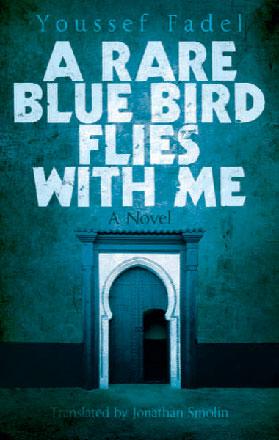You are here
‘His mistake was that he loved flying’
By Sally Bland - Jun 13,2016 - Last updated at Jun 13,2016

A Rare Blue Bird Flies with Me
Youssef Fadel
Translated by Jonathan Smolin
Cairo-New York: Hoopoe/American University in Cairo Press, 2016
Pp. 235
In the late 1990s, a time of political opening in Morocco, former political prisoners began publishing memoirs of the torture and abuse they had suffered after failed coup attempts in the early 1970s unleashed over two decades of repression. In this book, Youssef Fadel, who as a student activist was arrested and imprisoned in these so-called Years of Lead, tells the story of their suffering in novelistic form.
According to translator Jonathan Smolin, his novel “should be read as part of this collective experience of human rights abuses, testimony and reconciliation in Morocco… Unlike other works about the period, however, Fadel does not focus on a single real-world site of torture or the experience of one individual. Instead, he breaks new ground by weaving together details from dozens of accounts into a single… narrative that reflects the collective consciousness of the country during the Years of Lead.” (pp. x-xi)
“A Rare Blue Bird Flies with Me” is also notable for its innovative style. Fadel’s extensive use of the present tense give the book a compelling immediacy, while the bizarre occurrences and details he includes are well-suited to portray a situation that can only be described as such. Short sentences encase powerful descriptions ranging from harsh ultra-realism to lyrical surrealism, conveying life in a prison where inmates are literally left to starve and rot, as well as the hopes and dreams they once harboured.
Multiple voices alternate to tell the story from different angles: that of Aziz, the only surviving prisoner out of hundreds sent to an abandoned casbah in the desert; Zina, his wife, who sets off on one more desperate search for him; her sister; two prison guards; and Hinda, a dog at the casbah.
These diverse narratives reveal the past lives of the major characters — how they got where they now are, as well as a vast kaleidoscope of feelings and motivations: Aziz’s vacillation between logic and delirium as he thinks he is nearing death; Zina’s determination to find him despite many sidetracks; the guilty feelings of one guard as opposed to the total indifference of the other (he’s only following orders); and Hinda’s unique take on human behaviour: “It seems aggression runs deep in their blood. And their ignorance cannot be surpassed.” (p. 99)
But it is not all suffering. In the novel’s scant 24-hour now-time, as Zina travels south and Aziz tries to stay alive, their narratives take the reader back in time to their respective childhoods; there are charming descriptions of nature, magical encounters with birds and butterflies, and many passages on Moroccan popular culture.
One learns how they met, and how Aziz disappeared the day after their wedding 20 years ago, never to return. He was an air force pilot, and his sense of duty made him show up at the base that day as his commander had insisted, thus unwittingly involving himself in the attempted coup. As Zina sees it, “His mistake was that he loved flying. He was piloting his plane while I was on the roof waiting for him to appear. But he didn’t. Not in my sky or in any other sky.” (p. 141)
Fadel’s novel is not only an indictment of the authorities’ abuses during that period, but also of many social ills: the numbing effects of poverty, the misuse of religion, deceit, corruption and patriarchal norms. Aziz, Zina and her sister are all de facto orphans, shunted from relative to relative after their fathers leave their mothers and remarry, their mothers remarry, and so on. The children’s welfare seems to be the last priority in these arrangements. The precarious backgrounds of Aziz and Zina make their meeting and falling in love all the more joyful, only to be aborted by Aziz’s disappearance and imprisonment. It is as if the authorities and society conspire to dash the dreams of a whole generation.
The emphasis on childhood experiences, set in relief by Hinda the dog’s perspective on human cruelty, give Fadel’s story a universal scope stretching beyond the specifics of the Moroccan experience, to expose inhumanity wherever it may be. Taking this idea a step farther, the book is an implicit plea to nurture what is good in human beings rather than squashing their potential. “A Rare Blue Bird Flies with Me” is available at the University Bookshop (Gardens).
Related Articles
AMMAN — Former Iraqi foreign minister Tariq Aziz was buried in Madaba city, southwest of the capital, on Saturday. The body of Aziz arr
AMMAN — The government has approved a request by the family of Iraq’s former foreign minister Tariq Aziz, who died in Iraq on Friday, to bur
It is roughly a decade since the Nobel Prize in Literature ventured out of the global North. Even then, this year’s recipient, Abdulrazak Gurnah, resides in the UK, but he was born in Zanzibar, now part of Tanzania. His ancestry is Arab, his first language, Swahili, and his writing reflects this diverse background.


















